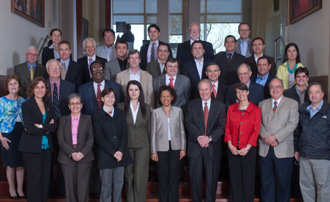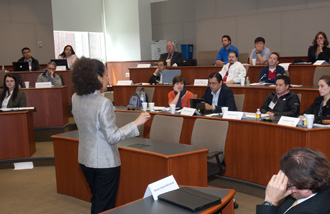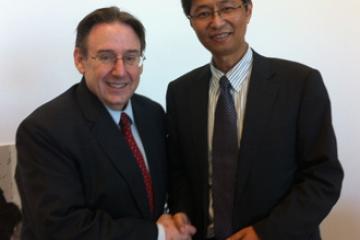Consortium meeting attracts top scholars in Latin America
More than 50 deans, administrators and scholars from business schools across Latin America converged on the Freeman School in March for the 13th meeting of the Latin American Research Consortium (LARC).

The Freeman School founded the consortium in 1995 to promote scholarly research on Latin American markets and business institutions. In 2007, Freeman added a dean’s workshop to the program to enable senior administrators from member institutions to share information on program development and strategic planning.
According to John Trapani, executive director of the Goldring Institute of International Business, which organized the meeting, the consortium grew out of the Freeman School’s Latin American Faculty Development PhD Program, which was created in 1994 to enable working faculty members at top Latin American business schools to earn their doctoral degrees while maintaining full-time employment. To date, more than 65 business professors at institutions throughout Latin America have earned their PhDs from the Freeman School through the program.
“The consortium was originally conceived as a way to enable our graduates to showcase their research and network with other scholars interested in research on Latin American markets,” Trapani explains. “Since then, it’s grown to encompass almost all the leading business schools in Latin America.”

This year’s meeting took place on March 22 and 23 and featured participation from a dozen top universities, including Centrum Catolica (Peru), EAFIT (Colombia), ESPAE-ESPOL (Ecuador), ICESI (Colombia), IESA (Venezuela), INSPER (Brazil), ITESM Monterrey (Mexico), ITAM (Mexico), UniAndes (Colombia), University of Chile, Universidad Francisco Marroquin (Guatemala) and University of Puerto Rico.
“We’ve worked with business schools in Latin America for 20 years to develop their faculties and academic programs, and many of those schools are now accredited by AACSB, which is the goal for all business schools,” Trapani says. “For us, the consortium meeting is a way to recognize the tremendous progress all the schools are making and also show our continued commitment to the deans, the schools and the region.”
For more information about the Latin American Research Consortium, visit GoldringInstitute.com.
